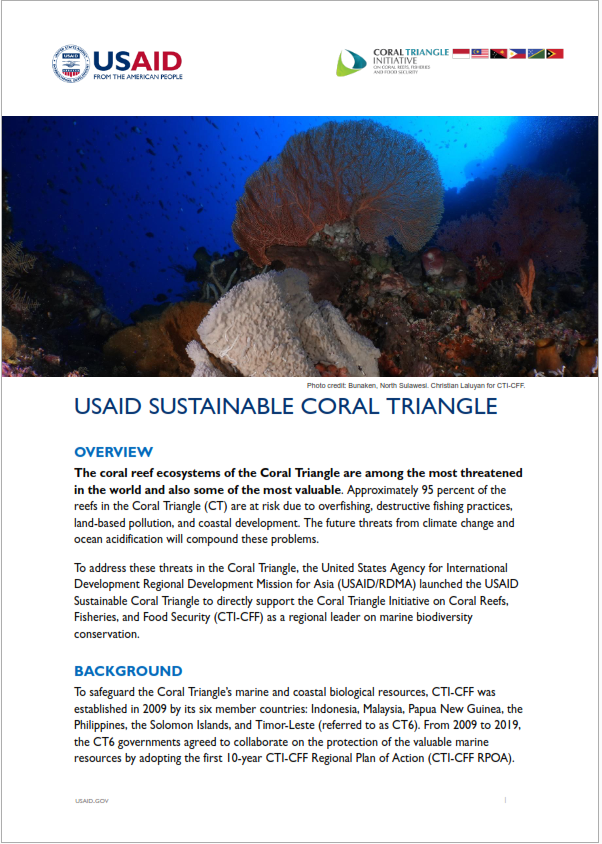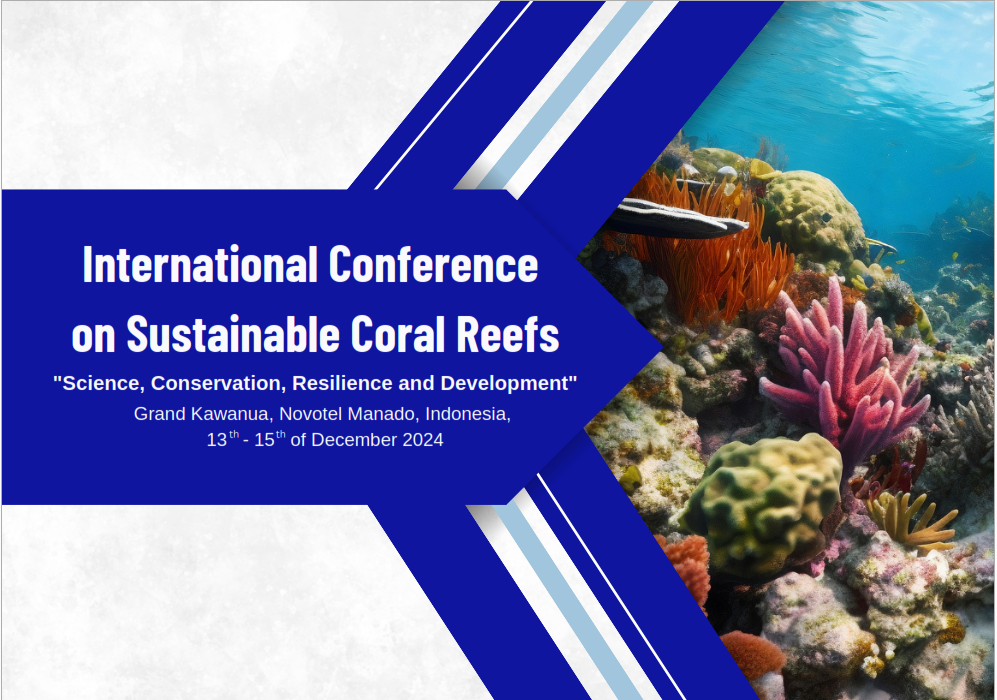CTI-CFF's 10th Marine Protected Areas Regional Exchange (MPA REX)
CTI-CFF's 10th Marine Protected Areas Regional Exchange (MPA REX) Drives Conservation Efforts Towards Achieving 30% Ocean Protection
-
CTI-CFF’s 10th MPA Regional Exchange advances progress towards CBD 30x30 target on ocean protection goal, emphasizes the collective commitment of CT countries to achieve the target.
- Introduction of IUCN Green List Standards for measuring MPA effectiveness, with CTI-CFF countries pledging to adopt this global standard.
- Strengthening regional cooperation for sustainable marine resource management focusing on MPA financing, capacity-building, and data management, fostering stronger collaboration for long-term marine conservation.
Manado, Indonesia, October 7-10, 2024 – The Coral Triangle Initiative on Coral Reefs, Fisheries, and Food Security (CTI-CFF) hosted the 10th Marine Protected Areas (MPA) Technical Regional Exchange (REX) and MPA Technical Working Group Meeting at the CTI Centre in Manado. The event brought together MPA focal points from the six Coral Triangle countries and CTI-CFF’s key strategic partners, to advance efforts in the management of MPAs, a cornerstone of CTI-CFF’s strategy to protect marine biodiversity, promote sustainable livelihoods, and build coral reef resilience across the region.
This MPA REX event, in addition to being attended by delegates from the six CTI-CFF member countries, also invited the participation of partners such as the Coral Triangle Center (CTC), Konservasi Indonesia (KI), and WWF Coral Triangle Program, all of which are actively working in MPAs across Southeast Asia and the Pacific. Two other key partners present are the International Union for Conservation of Nature (IUCN), which introduced the IUCN Green List Standards, and the Deutsche Gesellschaft für Internationale Zusammenarbeit (GIZ), which supports CTI-CFF through the Solutions for Marine and Coastal Resilience (SOMACORE) program.
Marine Protected Areas are essential for addressing global challenges like biodiversity loss and overfishing. As part of the CTI-CFF’s Regional Plan of Action 2.0 (RPOA 2.0), the initiative has committed to ensuring effective MPA management through the Coral Triangle Marine Protected Areas System (CTMPAS), which classifies MPAs into four categories. Categories 3 and 4 represent the highest level of protection and management, and achieving these categories remains a key goal for the region. Additionally, all six CTI member countries have committed to the global 30x30 target, aiming to protect at least 30% of marine areas by 2030, with timelines tailored to each country’s capacity.
“This event demonstrates our unwavering commitment to advancing marine conservation and sustainable management in the Coral Triangle,” said Mr. Christovel Rotinsulu, Deputy Executive Director for Program Services at the CTI-CFF Regional Secretariat. “Through the CTMPAS framework and our collaboration with partners like GIZ’s SOMACORE Project and the International Union for Conservation of Nature (IUCN), we are continuously improving MPA effectiveness, with over 10% of marine areas in the region already under protection as of 2024.”
The MPA Regional Exchange was held over four days. The first two days focused on country-level updates regarding achievements, sharing on MPA financing, and data management. A key activity that occurred during the first two-days was the introduction of IUCN Green List standards as a new tool for measuring MPA effectiveness.
The IUCN Green List is a global campaign for successful nature conservation. At its heart is the Green List Sustainability Standard that provides a global benchmark for how to meet the environmental challenges of the 21st century. The IUCN Green List offers locally relevant expert guidance to help achieve fair and effective nature conservation results in protected and conserved areas. It can help guarantee that wildlife and ecosystems can survive, thrive and bring value to communities everywhere.
On the third day, all participants went on a field trip to Bunaken National Park to observe and learn about the management of Bunaken from park managers. The final day was dedicated to the MPA Technical Working Group meeting, which focused on setting the 2025 work plan and targets in line with the Regional Plan of Action 2.0.
“Indonesia is proud to chair the MPA Technical Working Group,” said Mr. Ahmad Sofiullah from the Ministry of Marine Affairs and Fisheries of Indonesia, representing Chair of the MPA Technical Working Group. “Our collective efforts, from capacity building to data management, are crucial in ensuring the long-term protection of our marine resources. The CTI-CFF continues to be a model for multilateral regional cooperation in marine conservation.”
The exchange primarily discussed three key topics: the shared agenda between countries – particularly regarding the CBD 30x30 target, the effectiveness of MPA management and the tools used for measurement and data management, and the financing of MPAs.
CTI-CFF member countries have all pledged to the CBD Target 3 to protect 30% of their land and waters, with varying deadlines. Indonesia has pledged to achieve 30x45 and has so far protected 10% of its marine areas, covering 29 million hectares. Malaysia set a target to protect 10% of its marine areas under its Malaysian Policy of Biological Diversity 2022-2030, and has currently protected 5.3%, including significant mangrove areas, mostly in Sabah. Papua New Guinea (PNG) has committed to the 30x30 goal as well and has established several MPAs since the 1970s. Recently, PNG designated two new MPAs and is currently proposing at least 10 more with the help of development partners. The Philippines has already achieved 18.49% of its 30x30 target, while Timor-Leste is targeting 30% and has so far protected 3% of its waters with two established MPAs.
CTI-CFF recently signed a Memorandum of Understanding with IUCN which amongst other things focuses on the adoption of the IUCN Green List Standards in the management of MPAs across the region. Currently, two MPAs are in the process of obtaining IUCN Green List certification: the Sugud Islands Marine Conservation Area and Tun Mustapha Marine Park, both in Sabah, Malaysia.
IUCN highly appreciates the willingness of Coral Triangle countries to adopt the IUCN Green List standards. The agreement between the two organizations also includes the implementation of the SOMACORE project, funded by the German government through GIZ. Each country is expected to nominate two MPA sites for IUCN Green List certification. This is very relevant to the 30x30 target, ensuring that these areas are not only protected on paper but also meet high standards of management. It also ensures that MPAs contribute to the sustainability of resources and the well-being of local communities, a key mandate for the CTI-CFF.
“The adoption of the IUCN Green List Standards will enhance the sustainability and resilience of marine ecosystems in the Coral Triangle region. It is an important step toward achieving long-term conservation goals in the face of global challenges like climate change,” said Siska Sihombing, Program Officer IUCN Protected and Conserved Areas. “The IUCN Green List ensures benefits for people. What matters most is not the certification itself, but the process, where we witness improvements.”
In closing, the 10th MPA Regional Exchange reinforced the collective commitment of Coral Triangle countries to protect and effectively manage their marine protected areas. By sharing experiences, adopting global standards like the IUCN Green List, and advancing key initiatives such as the 30x30 target, the region continues to lead efforts in safeguarding marine biodiversity, like protecting and sustaining the world-famous coral reefs and breeding grounds of tuna, while ensuring the sustainability of resources for future generations. Through collaboration, capacity-building, and the engagement of local communities, the Coral Triangle Initiative strengthens its role as a global leader in marine conservation and sustainable development.
---000---
For further information, please visit: www.coraltriangleinitiative.org; contact: Dewi Satriani, Communication and Information Manager CTI-CFF Regional Secretariat, dewi.satriani@cticff.org; +62-811910970
Notes to Editor:
About Coral Triangle and Coral Triangle Initiative on Coral Reefs, Fisheries and Food Security (CTI-CFF)
Known as the global epicenter of marine biodiversity, the Coral Triangle covers 6 million square kilometers of ocean, spanning across six countries: Indonesia, Malaysia, Papua New Guinea, Philippines, Solomon Islands and Timor-Leste. It is home to over 500 species of reef-building corals and more than 2,000 species of reef fish, making it one of the most biologically diverse marine areas on the planet. The region provides vital ecosystem services and supports the livelihoods of more than 120 million people.
The CTI-CFF, established in 2009, is a multilateral partnership of the CT6 countries aimed at addressing critical issues such as marine biodiversity, food security, and climate resilience. Through its regional cooperation, the CTI-CFF promotes sustainable management of coastal and marine resources across the Coral Triangle, ensuring the long-term health of ecosystems and the livelihoods that depend on them.



